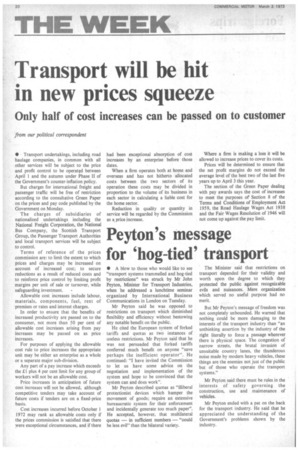Transport will be hit in new prices squeeze
Page 22

If you've noticed an error in this article please click here to report it so we can fix it.
Only half of cost increases can be passed on to customer
from our political correspondent
• Transport undertakings, including road haulage companies, in common with all other services will be subject to the price and profit control to be operated between April 1 and the autumn under Phase II of the Government's counter-inflation policy.
But charges for international freight and passenger traffic will be free of restriction according to the consultative Green Paper on the prices and pay code published by the Government on Monday.
The charges of subsidiaries of nationalized undertakings including the National Freight Corporation, the National Bus Company, the Scottish Transport Group, the Passenger Transport Authorities and local transport services will be subject to control.
Terms of reference of the prices commission are: to limit the extent to which prices and charges may be increased on account of increased cost; to secure reductions as a result of reduced costs and to reinforce price control by limiting profit margins per unit of sale or turnover, while safeguarding investment.
Allowable cost increases include labour, materials, components, fuel, rent of premises or rates and interest charges.
In order to ensure that the benefits of increased productivity are passed on to the consumer, not more than 50 per cent of allowable cost increases arising from pay increases may be passed on as price increases.
For purposes of applying the allowable cost rule to price increases the appropriate unit may be either an enterprise as a whole or a separate major sub-division.
Any part of a pay increase which exceeds the £1 plus 4 per cent limit for any group of workers will not be an allowable cost.
Price increases in anticipation of future cost increases will not be allowed, although competitive tenders may take account of future costs if tenders are on a fixed-price basis.
Cost increases incurred before October 1 1972 may rank as allowable costs only if the prices commission is satisfied that there were exceptional circumstances, and if there had been exceptional absorption of cost increases by an enterprise before those dates.
When a firm operates both at home and overseas and has not hitherto allocated costs between the two sectors of its operation these costs may be divided in proportion to the volume of its business in each sector in calculating a liable cost for the home sector.
Reduction in quality or quantity in service will be regarded by the Commission as a_price increase. Where a firm is making a loss it will be allowed to increase prices to cover its costs.
Prices will be determined to ensure that the net profit margins do not exceed the average level of the best two of the last five years up to April 3 this year.
The section of the Green Paper dealing with pay awards says the cost of increases to meet the purposes of Section 8 of the Terms and Conditions of Employment Act 1959, the Road Haulage Wages Act 1938 and the Fair Wages Resolution of 1946 will not come up against the pay limit.




































































































